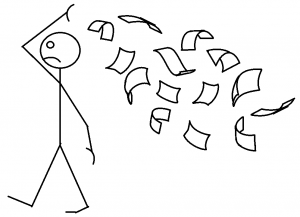Some time ago, you thought of a great idea for a story and started writing. Today, you can’t bring yourself to work on it any more. You’re not feeling the urge. You lost enthusiasm.

As you look back over it, you realize your writing sucks. You can’t bear to go on with it. You’ve come to believe it’s a waste of time.
You’re wondering what happened. How could you have been so fired up about the idea of the story, and so disgusted with the reality of it? Where did all that fervor, that passion, go? How do you get it back?
One option—the easiest one—is to give up. Admit defeat. Abandon the story and do other things with your time. I’ve explored that possibility before. Most often, that’s not the answer. You might be denying the world a good story, a salvageable one.
Maybe, if you search hard enough, or wait long enough, your motivation will return. Nah. As author Chuck Wendig explains in this post, nobody’s going to mail you some motivation, gift you some get-up-and-go, or present you a package of passion.
You have to rekindle that fire inside yourself, by yourself. Sorry. There’s no other way.
I know some techniques for doing that. Maybe one or more of the following will work for you:
- Reward. Give yourself small rewards for producing set amounts of writing. Grant yourself the reward only for output, not time spent. Note: food is not an ideal reward.
- Deadline. If you’re the type who works best under the pressure of time, create that pressure. Invent a deadline date and make it as real as you can—a visible calendar with the date circled in red. Devise a suitable (painless) penalty for missing the deadline, and a suitable reward for meeting it.
- Organize. If writing the story now seems intimidating and overwhelming, break it down into manageable parts. Finishing these small tasks will give you a sense of accomplishment and show progress toward the overall goal.
- Re-evaluate. Perhaps you’ve assumed you’d achieve brilliant prose in your first draft. Lower those expectations. Accept that this story might require several pass-throughs, each draft improving the story a little. The world won’t see your sausage-making process, only the final product.
- Remember. Think back to the origin of the story. Get back in that frame of mind. Recall why you felt so good about it then. Maybe the story needs some tweaking, some slight adjustments, from your original thoughts.
- Envision. Imagine a near future with your story finished, published, and succeeding. However you define ‘success,’ visualize an outsized amount—readers clamoring for your autograph, talk show hosts eager to interview you, vast royalties pouring into your savings account, whatever. Warning—don’t fall so much in love with this fantasy that you set yourself up for disappointment.
One or more of those techniques might help you fall back in love with your story, at least enough to finish writing it.
Take it from someone who’s used all six of those tricks at some point, none other than—
Poseidon’s Scribe


